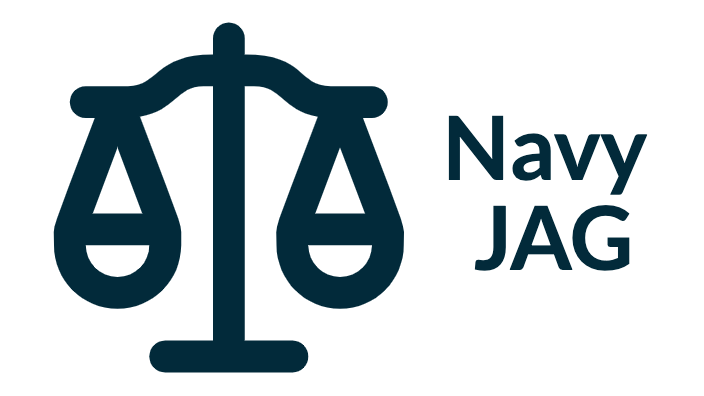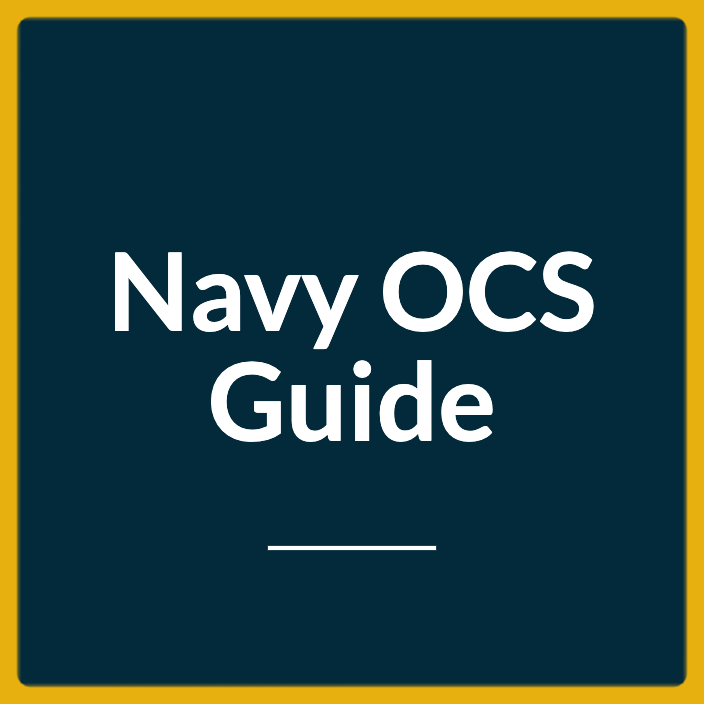Last Updated on November 16, 2023
This guide provides helpful information for those who wish to become a Judge Advocate General Officer in the United States Navy through the Judge Advocate General In-Service Procurement Program during the Fiscal Year 2024.
Judge Advocate General Corps Officer
Navy Judge Advocate General (JAG) Corps Officers are commissioned officers in the U.S. Navy. They help Sailors and their families with legal issues, mediate contracts between military personnel and contractors, investigate criminal cases, act as counsel in court, and advise commanders on the legality of specific orders or plans.

As lawyers for the US Navy, they handle operational law, which includes international law, the operational law of the sea, and war crimes. They are also responsible for prosecuting and defending criminal cases in court.
As a member of the Navy JAG Corps, you will do the most distinct kinds of legal work an attorney can do.
Working in places all over the world will give you hands-on experience with international law, civil litigation, and military justice. In private law firms, many young lawyers spend their first few years doing research.
As a Navy JAG, you will start working with real military clients as soon as you join the JAG Corps. Your work has a direct effect on the world, whether you are writing wills for Sailors who are deploying or telling Officers on a Navy aircraft carrier how to follow the rules of engagement.
Navy JAG In-Service Procurement Program
The Judge Advocate General’s Corps (JAG) In-service Procurement Program (JAG IPP) gives active duty enlisted people who meet certain requirements a way to become officers.
Some people chosen for the JAG IPP may train to get a Juris Doctor (JD) degree as part of getting ready for a JAG commission.
Who May Apply
Active duty enlisted Sailors and Navy Full-time Support (FTS) are eligible to apply for the JAG IPP.
Selected Reserves, Individual Ready Reserves, Active Duty for Training (ADT), Active Duty for Special Work (ADSW), or Canvasser Recruiter duty are not eligible to apply for this commissioning program.
Eligibility Requirements
Citizenship
Applicants must be citizens of the United States.
Age
Applicants must be at least 21 years old and able to complete 20 years of active duty commissioned service before reaching the age of 62.
Education
All applicants must have a baccalaureate degree from an approved college or university. All applicants must submit their Law School Admission Test results.
Direct commission applicants must have a JD degree from a law school that the American Bar Association (ABA) considers being accredited at the time of graduation under rules specified by the ABA.
Applicants for funded legal education training must submit a prioritized list of ABA-accredited law schools in the United States to which they have applied or plan to apply. Applicants are encouraged to apply to several schools.
Applicants must apply to at least one law school where they qualify for in-state tuition and one law school close to their present military station (if currently stationed in the United States).
They must apply to one school in a fleet concentration location, such as Norfolk, Virginia, Jacksonville/Mayport, Florida, San Diego, California, Pearl Harbor, Hawaii, or Washington, DC. Applicants must provide law school acceptance letters received prior to the selection board’s meeting.
Physical/Medical
Applicants must meet the pre-commissioning/accession physical standards for appointment as a JAG Corps officer, as outlined in Chapter 15 of the Manual of the Medical Department.
They must have submitted a pre-commissioning Department of Defense Standard Form (SF) Report of Medical Examination SF 88, Report of Medical History SF 93, or Report of Medical History DD 2807-1/Report of Medical Examination DD 2808 within the previous 12 months (or 24 months (about 2 years) for those applicants deployed).
Applicants must meet physical fitness and percent of body fat requirements at the time of application, training, and commissioning.
Rank
Applicants must be in the E-5, E-6, or E-7 paygrades at the time of commissioning.
Time in Service
Applicants for Funded Legal Education must have served on active duty for a minimum of four years and a maximum of eight years at the time legal study begins.
Those who apply for the direct commissioning program must have been in active service for at least two years and only ten years at the time of commissioning.
Rating
There are no rating restrictions for this program.
Behavior
Applicants must be of good moral character and have no record of disciplinary action under Article 15 of the Uniform Code of Military Justice, no court-martial convictions, and no civilian felony convictions by any civil court for misdemeanors (except minor ($300 or less fine) traffic violations) within the three years preceding the selection board.
On the application, any minor traffic offenses must be stated. An offense involving driving under the influence of an intoxicant (Driving Under the Influence/Driving While Intoxicated (DUI/DWI), etc.) is a major traffic violation and is disqualifying if committed within four years of the selection board’s date of convening.
Pre-service drug or alcohol usage is not an automatic disqualifier. Any substantiated in-service drug or alcohol abuse (record of either, regardless of date) will cause disqualification.
JAG Corps Interview
Applicants must undergo a Structured Interview prior to applying, under the interview protocols for all other JAG Corps accessions applicants.
Interviews can be organized using the website https://www.jag.navy.mil. By a date stated in the JAG IPP NAVADMIN or on the website, the applicant’s interview will be transmitted immediately to the JAGC Accessions Officer under standard JAG interview protocols.
Command Interview
Commanding Officers (COs) will appoint and convene a board of three officers in the grade of lieutenant or above, including one or more JAG Corps officers when available, who are not in the applicant’s direct chain of command, to interview and evaluate each enlisted applicant.
Each board member must complete and submit an Interviewer’s Appraisal Sheet, NAVCRUIT 1131/5, to the applicant’s career counselor.
COs must not give a candidate a copy of the interview until the application has been signed and forwarded to the JAG Corps Accessions Officer.
Command Recommendation
Applicants must get a good recommendation from their CO using the section on the Officer Programs Application, OPNAV 1420/1, called “CO’s Recommendation.” Make sure that all the parts are filled out and that the applicant meets all the eligibility requirements. If more than one person from that command wants to join, the CO should rank them.
The CO’s recommendation should include:
- A statement about any waivers the applicant wants;
- A statement about whether the applicant is on full duty without restrictions;
- A statement that the applicant meets the standards for physical fitness and body fat percentage; and
- A typed and signed copy of each board member’s NAVCRUIT 1131/5 as an enclosure.
Professional License
Direct Commission: Applicants must be licensed to practice law by a federal court or the highest court of a state, the District of Columbia, a U.S. Territory, or the Commonwealth of Puerto Rico. They must also be in good standing with that court.
Funded Legal Education Training: Those who are chosen must quickly apply to be allowed to practice law after they finish law school. The application will be sent to a federal court or the highest court of a state, the District of Columbia, a U.S. Territory, or the Commonwealth of Puerto Rico.
The chosen court must have authority over the place where the candidate went to law school, where the candidate lives, or, with the approval of the Assistant Judge Advocate General 06 (Operations & Management), any other place where the candidate may apply to practice law.
If a bar exam is needed in the area where he or she wants to practice law, the person chosen will take the first exam after getting the law degree.
When the person chosen passes the bar, he or she will quickly make travel plans (at no cost to the government) to go to a federal court or the highest court of a state, the District of Columbia, a U.S. Territory, or the Commonwealth of Puerto Rico and be admitted to practicing law there.
Upon Commissioning
Officer Development School
All those chosen must attend Officer Development School (ODS). Navy ODS is an intensive, 11-week leadership training program designed to give newly commissioned naval officers the skills and knowledge they need to be successful officers in the U.S. Navy.
The course covers a wide range of subjects, such as military history, tactics, naval rules, etiquette, and customs, naval engineering, management, and making decisions.
Participants at ODS also learn about the various parts of the U.S. Navy, such as the operations, supply/logistics personnel management, communications/intelligence teams, and aviation departments.
If an officer does not pass ODS, he or she will be administratively separated under Administrative Separation of Officers, SECNAVINST 1920.6D, or, if DCNO N1 thinks it is best, reappointed in another competitive category to finish his or her required active-duty service.
Selected individuals will stay in the program until all its requirements have been met.
Basic Lawyer Course
The Navy Basic Lawyer Course (BLC) is a two-week course for Navy JAG Corps officers that teaches them about the basics of military law.
During the course, people learn about things like legal research, evidence law, and how the court works. The goal of the course is to give JAG Corps officers the knowledge and skills they need to help their clients in both criminal and administrative cases.
The course also prepares students for more advanced courses in areas like international law, maritime law, human resources law, contracts law, and claims dispute resolution. Participants will also learn about things like how to think about ethics when doing military justice.
At the end of the course, students should have learned real-world legal skills that they can use to represent clients or cases at all levels of military justice.
Everyone who is chosen must finish the BLC at Naval Justice School. If an officer does not pass the BLC, he or she will be administratively separated under SECNAVINST 1920.6D or, if DCNO N1 thinks it is best, reappointed in another competitive category to finish his or her required active-duty service.
Constructive Credit
After the bar exam passage, credit for the entry grade will be given. If a candidate has never been commissioned before, they will be given credit for three years and be put in the 2500 designator as a Lieutenant Junior Grade (LTJG).
According to OPNAVINST 1120.11, entry grade credit is given (series). Commander, Navy Recruiting Command (CNRC) will make appointment documents based on entry grade calculations.
Below is the entry constructive credit guidance for JAG IPP:
| Qualification | Entry Grade Credit |
| Juris Doctor awarded per OPNAVINST 1120.11 (series) | Three years |
| Cases that are out of the ordinary and require unique skills or experience, as decided by the Secretary of the Navy. | 1/2 year of credit for every year, up to a maximum of three years |
Commission Appointment
Direct commission selectees and funded legal education training selectees who successfully finish law school and gain admission to the practice of law before a federal court or the highest court of a state, the District of Columbia, a U.S. Territory, or the Commonwealth of Puerto Rico will be appointed to the JAGC on the active-duty list, in a grade that matches their level of education.
Compensation
Those who are chosen for funded legal education training will get all the pay and benefits that go with their grade and length of service, as well as the following extra money.
The Department of the Navy (DoN) will pay for all tuition and fees, which will include one course to prepare for the bar exam.
The DoN will likewise pay for one bar exam, one application to a court for permission to practice law, and any other costs related to the bar exam. If the person chosen fails the first bar exam, they will pay for the second application and exam.
Service Obligation
All people who are chosen must serve in the military for eight years, with at least four years on active duty.
Funded Legal Education Training
Duty Under Instruction Obligation: People who are chosen must re-enlist for four years from the time they get orders to train. “Training (JAGC IPP)” must be written as the reason for reenlistment.
The following statement of understanding must be included: “I understand that once I am chosen for the JAGC IPP, this agreement becomes binding and cannot be changed unless it is allowed by the relevant MILPERSMAN article(s).”
Before a transfer, you must reenlist to get orders. Navy Personnel Command (PERS-4416) should be told right away if an applicant who gets orders does not want to stay in the service longer to qualify. After the agreement is made, it cannot be changed unless it is allowed by the relevant MILPERSMAN article (s).
This is on top of any other service obligations the selectee may have under any other law or agreement. Selected people will keep their enlisted status and be able to move up in their ratings according to the Navy’s system.
Post-Training Obligation: Selectees who receive paid legal education training will serve two years (24 months) of active-duty service for each year (12 months), or any part of that, of paid legal education training in the program.
This obligation will run at the same time as the selected person’s eight-year minimum commissioned service obligation, of which four years must be spent on active duty. This service obligation starts as soon as a commission is accepted.
The officer still must meet this service obligation because of the law or an agreement. This obligation is not met while a selectee is in law school.
Time spent during summer vacation under orders at the Office of the Judge Advocate General or a Commander, Naval Legal Service Command, or on leave is considered “training in the program” and counts day-for-day toward obligated service earned before entering the program.
Disenrollment
All selectees who drop out of the program before they get their commissions will keep their enlisted rank in the Navy or Navy Reserve and be available for general assignment, unless the relevant MILPERSMAN article says otherwise.
Selectees who drop out of funded legal education training will have to serve a two-year (24-month) active-duty service obligation (ADSO) for each year (12 months), or any part of a year, of their funded legal education training, up to a maximum of six years, unless they are released earlier under the applicable MILPERSMAN article(s) (72 months).
This ADSO is besides any other service obligations the disenrolled selectee may have under other laws or contracts.
Under Section 2005 of Title 10, U.S. Code, if a selectee does not finish the ADSO, they must pay back the United States Treasury an amount that is the same proportion of the total cost of law school that the selectee received to the total amount of active-duty service that the selectee agreed to serve.
More Information
If you wish to learn more about the JAG IPP, contact your local Command Career Counselor for further guidance. You may also visit: https://www.jag.navy.mil/careers_/careers/opportunities_ipp.html
If you are not an enlisted member and wish to become a Navy JAG Corps Officer, contact your local Navy Officer Recruiter for more information.
Career counselors and recruiters will provide you with information you are unlikely to find online.
Hope this helps your career planning.

